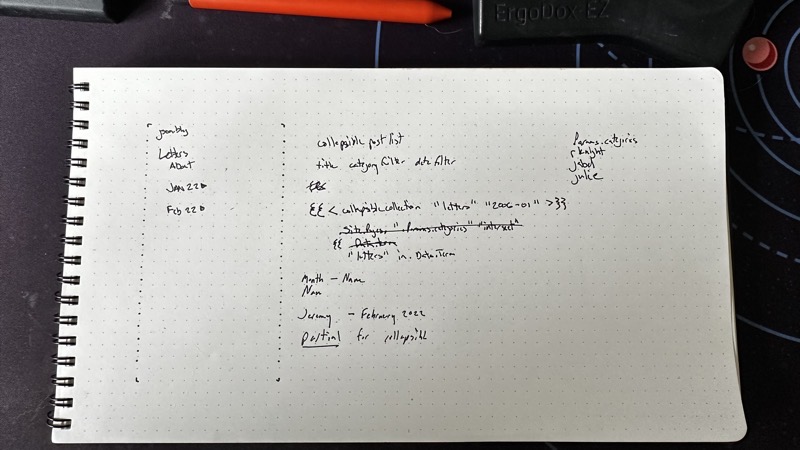Hi Jason,
It’s April, and it’s time for me to write you a letter. I read about your experiment and immediately thought it was a great idea. But would I be able to keep up? I wasn’t sure. I signed up nevertheless and received your reply, “You got April.” At least I didn’t have to think about it for a few months. I followed your experiment with others, and it was going better than I envisioned it, and I’m glad I opted in. I was a bit apprehensive after seeing the quality of the conversations, though, as I mentioned on Micro.blog a few weeks ago.
I have always enjoyed writing. My earliest memories of journal writing were in 1988 when I was 11 years old. I remember that distinctly because I received this free journal as a gift for my annual subscription to Target, a kid’s magazine in India. It asked me to describe myself, my best strengths, weaknesses, etc.. I remember asking my mother about what she thought my best strength was because, for the life of me, I couldn’t think of any that was worth writing down in the About Me section of a journal. She suggested I write about how good I am at being focused when reading, so that’s what I did. Over the next year, I wrote a couple of lines in the lines provided for each day. Often I had more to say than the space provided, so I wrote mostly to capture the highlights of my day. It was nothing exciting and mostly about school or friends. I recall writing about some world events, too; something about a Palestine state formed, which was surprising now that I write about it since it still doesn’t exist as an independent state. So I looked it up as I wrote this and learned that it was indeed declared as a state on November 15, 1988, by the Palestinian Liberation Organization.
Anyway, back to my journal, and now that I think of it, thanks to my writing, some of my memories from my childhood are from that year. Maybe because I wrote them down, eventually, as I came to the end of the year, I ran out of space and stopped writing in a journal. I would write off and on again in a notebook, but never as consistently as I did that year. Eventually, school got busier, and if you know anything about the Indian education system, they make you write needless things until you begin to hate the act of writing itself. So I could imagine myself getting any more writing done at the end of the day. My school essays were slightly better than my peers, so they got noticed by my teachers, and I was encouraged to enter into inter- and intra-school essay competitions. Nothing can kill the joy of writing more than making it a competition. But that’s how things are in India. With a billion+ people, you must constantly compete in every facet of your life. Yes, it was as tiring as it sounds.
As usual, I have rambled on without telling you more about my current life. I live in Austin with my wife and almost-12-year-old son. I work at the University of Texas at Austin and have worked here for the last ten years and am involved in academic research, although from the perspective of research operations. I’m not an administrative bureaucrat or one of those umpteen Vice Presidents of
I’ll stop now lest you think I’m writing a month’s worth of letters on the first day. I look forward to hearing from you.
Cheers,
Pratik
Hi Pratik,
Recently I remarked on how I’ve written a lot less in DayOne since coming home to Baltimore from about 2.5 months spent in Mexico this winter. Even though it’s only been a little bit since I’ve been home, I’ve been having a similar sense that by not writing as often lately, I am forming less distinct memories. Of course, I am comparing a time of relative normalcy to a time that was quite distinct (living in Mexico City), but I absolutely believe that writing about our experiences solidify them. Much like we organize our thoughts and what we’ve learned in our sleep, I think writing about our experiences helps us to re-experience them as well as add a layer of metacognition that serves to solidify them.
I’ve worked in education in some form most of my professional life. I transitioned right from my undergraduate studies to a degree in urban education policy, and then worked at a state department of education, a large urban school district, a university research center, and for the last 9 years at a technology company that exclusively works with K-12 schools. Given your current role at a university, your almost-12-year-old, and experiences in India, I’m guessing you have a lot to say about how these systems do or don’t work.
I’ve been having a bit of a crisis of confidence around education lately. The political environment has been… less than encouraging. I’ve generally fallen on the wonkish-side that might snidely remark that one of the challenges with education is everyone has an opinion based on their own experiences with it. I prefer data, and so I’ve spent very little time investing in understanding my own educational experiences with an adult eye. I think this is a lot easier when you’re child-free and not re-experiencing education through that lens. But lately, I think in part because of the chaos of the politics around schooling and my own concern about the health of our K-12 system in the US, I’ve found myself drawn to re-examination what was so crucial about school, at each level and time, for me.
It’s not like I feel like I had the ideal educational experience or trajectory– far from it– but I want to understand those experiences and moments that were formative for me. How do we find, capture, and encourage what matters. In some ways, that’s been an increasing part of this project– what matters to me and the person I’m talking to right now? How can these letters be a space to think about at least a little bit about what matters this week?
Writing in your journal mattered, but those essay competitions didn’t. Or maybe they did, but in a completely different way. Hopefully writing these letters will matter, at least for a little bit for you in April the way they have for me this year.
Jason













